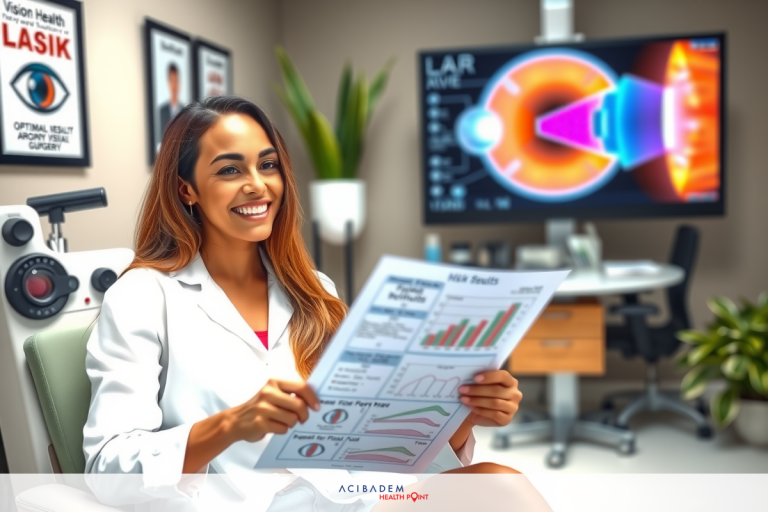Will I Need Special Eye Exams After LASIK Surgery?
Will I Need Special Eye Exams After LASIK Surgery? The journey of vision correction does not end with the completion of a LASIK operation. Post-operative care serves as an essential part in ensuring successful outcomes, and this includes special eye exams. These evaluations are no ordinary check-ups; they play a critical role in observing ocular health, tracking progress, and catching any potential issues before they escalate.
How often should one undergo these special eye exams? The answer is not set in stone since it depends on individual recovery rates and specific circumstances. Regardless of frequency, what remains constant is what happens during these visits to the ophthalmology clinic. Each session offers an opportunity for professionals to conduct various tests that assess your eyesight’s condition following surgery. Such meticulous postoperative care leads to optimal results and contributes significantly towards maintaining good vision longterm.
Why are Special Eye Exams Important?
Special eye exams, conducted after LASIK surgery, form the cornerstone of effective post-operative care. These examinations provide a detailed overview of your ocular health and enable medical professionals to keep track of your healing progress. The importance of these evaluations cannot be understated; they serve as vigilant guards against potential complications that may arise post-surgery.
Eye surgeries like LASIK can bring about changes in an individual’s vision profile. It is here where special eye exams demonstrate their value by closely monitoring these shifts. Information from check-ups at an ophthalmology clinic helps doctors determine if the patient’s eyes are adjusting well to surgery or if there are any concerns. By catching anomalies early, doctors can intervene swiftly and prevent further issues from developing.
It’s not just about identifying problems; special eye exams also play a critical role in enhancing comfort and optimizing visual outcomes following LASIK surgery. They allow healthcare providers to make necessary adjustments or suggest helpful measures tailored specifically for each patient’s unique needs and circumstances. This contributes to a smoother recovery process and improved overall vision quality.
Frequency of Special Eye Exams
The frequency of special eye exams after LASIK surgery is not a one-size-fits-all matter. It’s tailored to each person’s unique medical needs and recovery rate, making it an integral part of the personalized post-operative care plan. Some patients might experience swift healing processes requiring fewer visits, while others may need more rigorous monitoring.
Special eye exams generally kick off soon after your LASIK operation. The initial check-ups are important as they enable your ophthalmologist to confirm that the procedure went smoothly and that the healing process has begun correctly. These early appointments serve as an opportunity for doctors to detect any immediate issues or complications resulting from surgery, ensuring prompt intervention if needed.
As time progresses and provided no notable problems arise, these specialized vision check-ups tend to become less frequent. This doesn’t diminish their importance in maintaining long-term ocular health postLASIK surgery. At every stage of recovery, an expert eye exam provides valuable insights into your eyes’ adaptation to their new visual state, ensuring effective follow-up care.
What to Expect During a Special Eye Exam?
Special eye exams following LASIK surgery involve more than just your typical vision check-up. They are comprehensive evaluations designed to assess every aspect of ocular health post-surgery. Your ophthalmologist

will conduct a series of tests, each with its unique purpose in the broader picture of eye care.
The initial phase includes evaluating visual acuity using a Snellen chart or a similar tool. This test assesses your ability to discern letters or symbols at specific distances, which is essential for understanding your eyes’ functionality after LASIK surgery. The cornea’s condition is thoroughly examined using specialized instruments to observe and measure factors like thickness and curvature, which are directly affected by the surgical procedure.
Beyond these standard tests, specialized eye exams explore areas not typically covered in regular vision screenings. Doctors may use tonometry to measure intraocular pressure, a crucial marker for conditions like glaucoma that could arise after LASIK surgery. They may also conduct dilated eye examinations to inspect your retina’s health, adding valuable data to the overall evaluation within an ophthalmology clinic.
These specialized eye exams, despite their complexity, share one common goal: ensuring the best results from LASIK surgery and sustaining long-term eye health, one check-up at a time.
Frequently Asked Questions
Q: How soon after LASIK surgery should the first special eye exam be scheduled? A: Your first postoperative check-up is scheduled within 24 to 48 hours following LASIK surgery. This can vary based on individual circumstances and surgeon recommendations.
Q: What is the primary purpose of these exams in relation to post-operative care? A: Special eye exams play a vital role in monitoring your healing progress after LASIK surgery. They allow doctors to detect any potential complications early and take necessary corrective action, contributing towards successful recovery and optimal visual outcomes.
Q: Can I expect all my special eye exams at the ophthalmology clinic to be identical? A: While there may be some standard tests conducted during each visit, not all appointments will be exactly alike. The nature of your examinations will depend on various factors such as how far along you are in the recovery process and whether any specific issues need addressing.
Q: Are these special eye exams necessary even if I feel my vision has improved considerably postsurgery? A: Yes! Even if you experience significant improvements in vision after LASIK surgery, it’s crucial to continue with your planned check-ups. These evaluations provide valuable insights that go beyond just assessing visual acuity, they also monitor overall ocular health which contributes towards maintaining good vision long-term.








